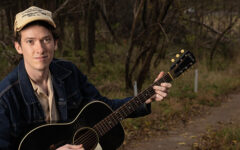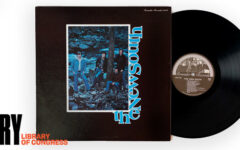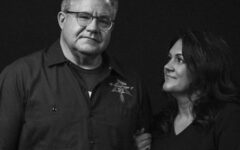
Everything has been coming up roses of late for Alan Bibey. Though he has been working as a professional grasser for more than 35 years, the past few have seen recognition come his way like it never had before. Winning consecutive IBMA Mandolin Player of the Year awards, hosting his own popular mandolin camp, and releasing a pair of highly consequential albums since 2015 with his touring group, Grasstowne, has kept him in at the forefront of the bluegrass conversation at every level.
If you’ve been listening to bluegrass radio much this year, you know that Alan and Grasstowne have a new record, Hitchhiking To California, with several singles that have been prominent on our Bluegrass Today Weekly Airplay chart. Bibey has been able to maintain a consistently strong group around him this past five years, recently enhanced by the addition of Kati Penn on fiddle and vocals.
This new project is the band’s first with Billy Blue Records, and Jerry Salley, the label’s A&R Director, has certainly put his stamp on the record with songwriter credits on three of its 11 tracks. But the real credit for the artistic success of this effort goes to Bibey and his talented bandmates, the aforementioned Kati Penn, Justin Jenkins on banjo, Zak McLamb on bass, and Tony Watt on guitar. A couple of guest artists make an appearance as well, Darin & Brooke Aldridge sing harmony with Alan on one song, Ron Stewart adds some guitar and fiddle, and Patrick M’Gonigle, a member at the outset of this recording, has harmony parts on five tracks.
Starting with the title track, a reworked version of Wes Golding’s classic from the Boone Creek days, Alan’s mandolin and lead vocal set the tone. Not known as a singer in his days with New Quicksilver and IIIrd Tyme Out, he has developed into a fine bluegrass vocalist and a skillful songwriter. In fact, several of the strongest songs here are his, having added lyrics to Hitchhiking To California, a Gospel number which ends the album, When He Calls My Name, written with Ronnie Bowman, and a lovely song, Daddy And Me, composed with Jerry Salley, about Alan’s father.
I was fortunate to know his dad, James Bibey, and it is clear through Daddy And Me that Alan feels his loss deeply. James was the one who drove young Al to the many bluegrass festivals and conventions before he was old enough to drive, where he learned his love for bluegrass music and became such a gifted practitioner. James was a picker himself, but not up to the level of his son, and he took immense pride in seeing Alan on stage with top touring bands as his career blossomed. Al often showed up for gigs as an adult with his dad in tow, and there wasn’t a happier man to be found in the audience. The song encapsulates Bibey’s intense love for his father, to the degree that he has said that he doubts that he could get through it on stage. Lucky us that it was captured in the studio, with Darin and Brooke singing along. Good luck keeping a dry eye.
Blue Collar Blues was the record’s second single, coming from Rick Lang and Jerry Salley, a groovin’, mid-tempo song about the life of a working man who labors every day for his wife and family. From there we get a snappy happy grass number, I Want To Be Loved (But Only By You) from The Bailes Brothers, who had a number of country hits in the 1940s.
The band trios are greatly complemented by Kati’s voice up top, and she gets a feature as well on a special treat, a Jake Landers song that has not been recorded before now, I Don’t Know When. Penn joined the group while this album was bring recorded, and we hope to hear more of her singing on future releases. We have missed hearing her since the breakup of NewTown, and she shows here why she is so highly regarded in bluegrass circles. The Queen, in all her glory, has nothing on this smooth and sultry chanteuse.
Banjo man Justin Jenkins gets his highlight on a tune he wrote called Messin’ With Sasquatch. Not sure we want to know the story behind that, but Justin once again demonstrates here that he is on the very top row of Scruggs/Crowe banjo players in our industry. It would be nice to see that recognized by the IBMA Awards sometime soon. His playing throughout the record is consistently first rate.
Surely the most surprising track is a grassed up version of Take The Long Way Home, a mega hit for British rockers, Supertramp, in 1979. Prior to hearing this cut, you probably would never imagine it becoming a bluegrass song, but it works perfectly. Bibey had mentioned before this release that he was a bit concerned how the bluegrass world would find his arrangement, a hard driving mash-style rendition, but he needn’t have worried. His mandolin tears through the changes and the band simply kills it.
Also worthy of mention are Crime At Quite Dell, from Chris Stuart, a true murder ballad about tragic events in West Virginia in 1931, and Rhythm Of The Rails, a tasty song from Craig Market and Wayne Winkle, a minor key tale of railroad lore. When He Calls My Name closes things out in fine fashion with four-part Gospel harmony.
Bibey has benefited tremendously from a crisp rhythm section, provided by his mandolin and the strong rhythm guitar of Tony Watt, who is always there with the right sound, and Zak McLamb, whose bass is steadily on point and stands out notably on the title track.
Hitchhiking To California is more than a success, it is a triumph for Alan Bibey & Grasstowne, contemporary bluegrass at its very best.







